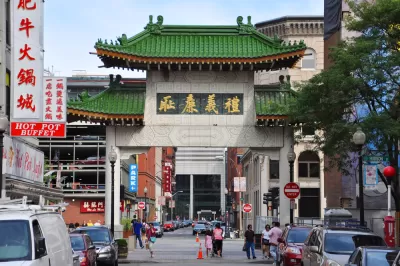The increasingly popular community-oriented mechanism makes neighbors into property owners and preserves affordable housing in perpetuity.

An article by Alexander Thompson and Jocelyn Yang highlights the benefits of community land trusts, which “are pursuing a novel solution to the nation’s affordable housing crisis: They’re buying their own properties to preserve them as affordable housing in perpetuity and give residents more say over what happens in quickly changing neighborhoods.”
“As neighborhoods change and gentrify really fast, the idea of having community control and having more say about how neighborhoods are changing and who’s going to be able to live in the neighborhood over time, from an affordability perspective, I think becomes really important,” says Beth Sorce, who works with community land trusts nationwide at the Grounded Solutions Network, an affordable housing advocacy group.
Imported from Israel’s kibbutzim in the 1970s by Charles Sherrod, the community land trust concept focuses on affordability and community control. Land trusts “reduce the discrimination baked into that system and empower communities to actively fight it,” says Andre Perry, a housing policy expert at the Brookings Institution. “The trust, which is governed democratically by residents and neighbors, can decide to whom the dwelling can be sold and at what price, usually through a covenant in the lease. This ensures the property remains affordable.”
The article highlights Boston’s Chinatown Community Land Trust, which has acquired seven units, and several other trusts around the country. “Really, land trust leaders say, homeownership is just one aspect of their focus on what [Sheldon Clark, who recently served as president of the board of the Douglass Community Land Trust in Washington, D.C.,] calls the “big C” in community land trusts: the community.”
FULL STORY: In Boston, housing that’s affordable – because the community owns the land

Planetizen Federal Action Tracker
A weekly monitor of how Trump’s orders and actions are impacting planners and planning in America.

Map: Where Senate Republicans Want to Sell Your Public Lands
For public land advocates, the Senate Republicans’ proposal to sell millions of acres of public land in the West is “the biggest fight of their careers.”

Restaurant Patios Were a Pandemic Win — Why Were They so Hard to Keep?
Social distancing requirements and changes in travel patterns prompted cities to pilot new uses for street and sidewalk space. Then it got complicated.

Platform Pilsner: Vancouver Transit Agency Releases... a Beer?
TransLink will receive a portion of every sale of the four-pack.

Toronto Weighs Cheaper Transit, Parking Hikes for Major Events
Special event rates would take effect during large festivals, sports games and concerts to ‘discourage driving, manage congestion and free up space for transit.”

Berlin to Consider Car-Free Zone Larger Than Manhattan
The area bound by the 22-mile Ringbahn would still allow 12 uses of a private automobile per year per person, and several other exemptions.
Urban Design for Planners 1: Software Tools
This six-course series explores essential urban design concepts using open source software and equips planners with the tools they need to participate fully in the urban design process.
Planning for Universal Design
Learn the tools for implementing Universal Design in planning regulations.
Heyer Gruel & Associates PA
JM Goldson LLC
Custer County Colorado
City of Camden Redevelopment Agency
City of Astoria
Transportation Research & Education Center (TREC) at Portland State University
Camden Redevelopment Agency
City of Claremont
Municipality of Princeton (NJ)




























